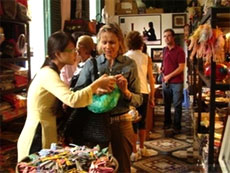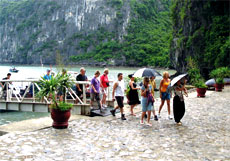 The
tourism stimulus campaign 2010 has seven main areas, three of which are
brand-new. They are a sales program in the “low” season called
“Impressive Vietnam Grand Sale 2010,” aiming to attract more domestic
and foreign guests, an on-point tourism promotion program for those
visiting Vietnam with the motto “Friendly Vietnam welcomes you” and a
countryside program for overseas Vietnamese.
The
tourism stimulus campaign 2010 has seven main areas, three of which are
brand-new. They are a sales program in the “low” season called
“Impressive Vietnam Grand Sale 2010,” aiming to attract more domestic
and foreign guests, an on-point tourism promotion program for those
visiting Vietnam with the motto “Friendly Vietnam welcomes you” and a
countryside program for overseas Vietnamese.
Diversified stimulus
According to Nguyen Van Tuan, Director General of the Vietnam
National Administration of Tourism (VNAT) and general manager of the
second campaign, the campaign is specifically aimed to increase the
number of domestic tourists as well as those from Vietnam’s main
markets. In particular, it focuses on high-spending tourists who stay
many days in Vietnam in order to increase tourism revenues. In general,
VNAT hopes to welcome 4.2 million international arrivals and 27-28
million domestic tourists, Tuan stated.
Among the three new programs, the tourism industry will concentrate
more on the “Impressive Vietnam Grand Sale 2010” program in the low
season to attract more customers. This kind of tourism through sales has
recently developed strongly, says Vu The Binh, Director of Department
of Travel under VNAT, adding that this is probably the main income
generator for the tourism industry in many countries in the region.
To achieve good results, VNAT will cooperate with the Trade Promotion
Bureau under the Ministry of Industry and Trade and Vietnam Airlines to
carry out the program during August and September in big cities and
major tourism centers across Vietnam like Hanoi, Danang and HCMC.
Many activities will run during the two months of the program such as
organizing lucky draws for customers at supermarkets and shopping
centers that register to join the sales program, opening the Impressive
Vietnam Grand Sale Fair 2010 with discounts from 10-50% and much more.
Tourists who participate in the sales programs will also get some
additional benefits like a value-added tax refund, tourist privilege
cards and shopping coupons. At any shopping place participating in the
program, tourists can show their passports or ID cards to receive the
benefits.
“Traveling combined with shopping is a trend that is now growing
well,” Binh says. “The revenue from shopping by tourists is the main
source of income for the tourism industry in Thailand, Malaysia and
Singapore. These countries have been successful in organizing sales
campaigns for the past few decades. Vietnam will follow the trend, but
we will do it in different ways to adapt to Vietnam’s specific
conditions.”
Response from enterprises
Businesses in the travel and hospitality sector hope that after the first campaign last year,  the tourism authorities have more experience in organizing a tourism stimulus campaign so that the tourism industry and enterprises will benefit from the second campaign.
the tourism authorities have more experience in organizing a tourism stimulus campaign so that the tourism industry and enterprises will benefit from the second campaign.
Tran Kim Long, General Director of Bong Sen Corporation, which
manages a number of hotels, restaurants and travel agencies nationwide,
told the Weekly that although he cannot tell exactly what effects the
stimulation program brought to the company’s business last year, Bong
Sen supports the campaign. One way or another, such a campaign has had
positive effects on the company’s business results in particular and
enterprises and Vietnam’s tourism in general.
Since late last year, affiliates of Bong Sen Corporation, including
Palace Saigon Hotel, Bong Sen Saigon Hotel, Bong Sen Annex Hotel,
Vietnam House Restaurant, Lemongrass, Brodard Bakery and Lotus Tours
have already had plans for 2010. Many promotion programs to stimulate
sales are the main parts of the plans.
Long says that these plans will be actively adjusted to adapt to
market developments during the year as well as to correspond to VNAT’s
stimulus campaign. “If VNAT organizes such campaigns continuously, this
is really a good chance to create the conditions for enterprises in the
tourism industry to boost their business,” he says. “I hope that this
year’s campaign will have better effects on Vietnam’s tourism. Moreover,
to make an effective stimulatus campaign, it is necessary to have good,
comprehensive cooperation among the four main elements of the tourism
industry, including tour operators, hotels, shopping centers and
airlines.”
Phan Dinh Hue, Director of HCMC-based Viet Circle tour operator,
agrees with Long: “We always welcome such campaigns, so this year we
will also join with price discounts from 5-10% and other programs. More
discounts will be offered if other suppliers also provide more
discounts.”
Meanwhile, Saigontourist Travel Service Co. already plans to boost
activities to popularize Vietnam’s tourism brand in international
markets by participating in fairs and exhibitions. Besides introducing
tour programs in Vietnam and seeking more partners, these events help
people understand more about Vietnam’s tourism potential.
To support VNAT’s campaign, the flagship air carrier Vietnam Airlines
has announced a 50% discount for domestic flights from March 1 till the
end of this year. It will also work with VNAT to promote Vietnam’s
tourism abroad and through mass media.
Long, Hue and other business people comment that this year’s campaign
seems more professional. So, to get better results, they say that
Vietnamese tourism should focus more on training human resources and
building infrastructure to meet tourism demands. The infrastructure
system has seen some improvements, but they are not comprehensive.
Community participation in tourism is also very important.
If a really friendly image of the Vietnamese country and people
combined with a better infrastructure system are created, Vietnam’s
tourism will grow, Hue says. “In my opinion, VNAT must have a good
long-term strategy as well as a detailed plan for every year,” Hue adds.
“This work needs the participation of a group of experts, and then VNAT
will design specific activities based on consultations. It is a fact
that so far VNAT has made plans by itself, so they often do not meet the
practical demands of tourists and travel agencies.”
Above all, these enterprises hope that with the second tourism
stimulus campaign, companies in Vietnam’s tourism sector will start to
actively cooperate with each other. VNAT’s role is only to provide
direction.